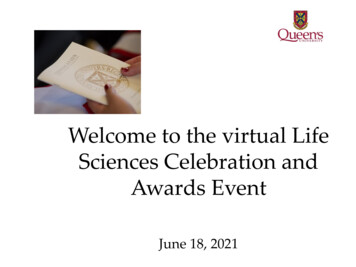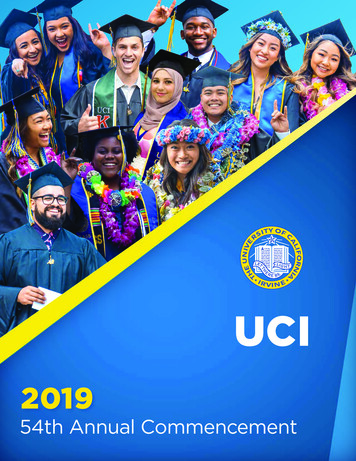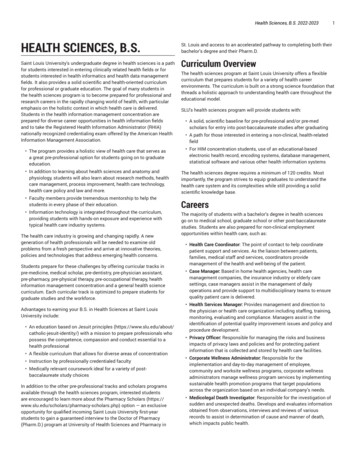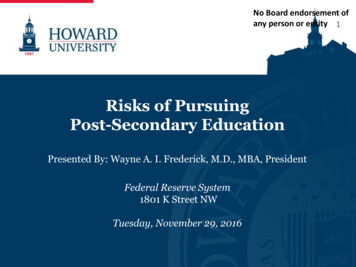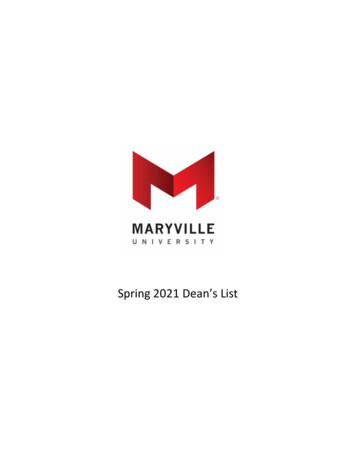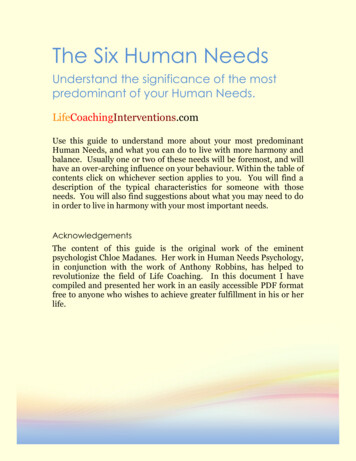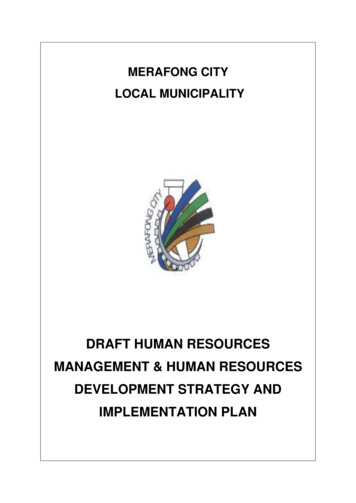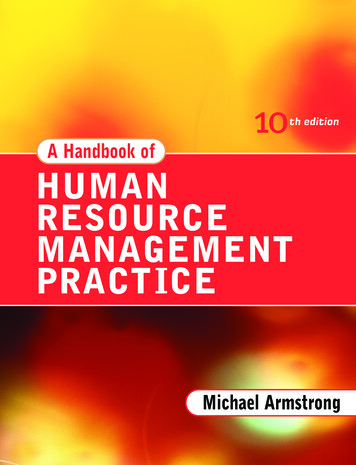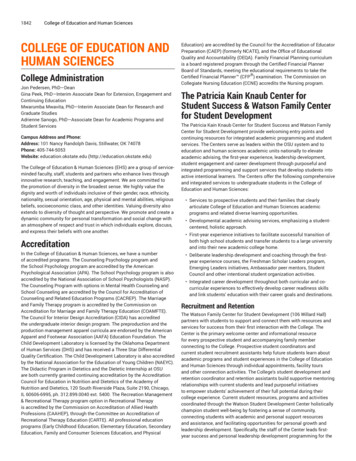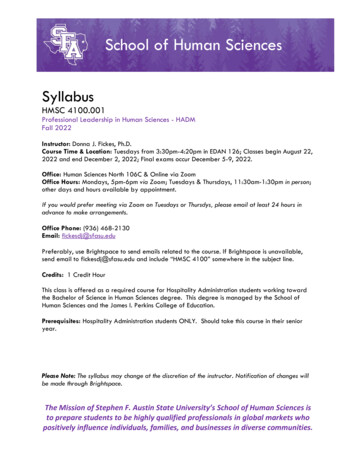
Transcription
School of Human SciencesSyllabusHMSC 4100.001Professional Leadership in Human Sciences - HADMFall 2022Instructor: Donna J. Fickes, Ph.D.Course Time & Location: Tuesdays from 3:30pm-4:20pm in EDAN 126; Classes begin August 22,2022 and end December 2, 2022; Final exams occur December 5-9, 2022.Office: Human Sciences North 106C & Online via ZoomOffice Hours: Mondays, 5pm-6pm via Zoom; Tuesdays & Thursdays, 11:30am-1:30pm in person;other days and hours available by appointment.If you would prefer meeting via Zoom on Tuesdays or Thursdys, please email at least 24 hours inadvance to make arrangements.Office Phone: (936) 468-2130Email: fickesdj@sfasu.eduPreferably, use Brightspace to send emails related to the course. If Brightspace is unavailable,send email to fickesdj@sfasu.edu and include “HMSC 4100” somewhere in the subject line.Credits: 1 Credit HourThis class is offered as a required course for Hospitality Administration students working towardthe Bachelor of Science in Human Sciences degree. This degree is managed by the School ofHuman Sciences and the James I. Perkins College of Education.Prerequisites: Hospitality Administration students ONLY. Should take this course in their senioryear.Please Note: The syllabus may change at the discretion of the instructor. Notification of changes willbe made through Brightspace.The Mission of Stephen F. Austin State University’s School of Human Sciences isto prepare students to be highly qualified professionals in global markets whopositively influence individuals, families, and businesses in diverse communities.
2I. Course Description and Credit Hour JustificationHMSC 4100 “ Professional Leadership“” is a 1-credit hour course. This course will typically meetone time per week for 50-minutes for 15 weeks culminating with a 2-hour final examination inweek 16. Students in the course will have weekly readings from the content modules and willparticipate in a variety of activities which may include: discussions, assignments, and quizzes. Forevery hour a student spends engaging with the course content, they spend at least two hourscompleting associated activities and assessments. For every hour a student spends engaging withthe content, he/she/ze should expect to spend a minimum of two hours completing associatedactivities and assessments (30 hours per semester). A 2-hour final exam is given in the 16th week.HMSC 4100 will be delivered in a face-to-face format, though some content, assignments, andactivities will be delivered through the university’s Learning Management System (LMS),Brightspace. Each student is required to have access to a computer with internet capabilities inorder to access the Brightspace course components. Each student is also required to have aworking, university (jacks.sfasu.edu) email account.As a student of Stephen F. Austin State University, you have free access to this course’sBrightspace site. You will need to access the course regularly throughout the semester.Assignments for this course will be submitted electronically through Brightspace, unless otherwiseinstructed. Some assignments may require audio files. Students must have a working computermicrophone or the ability to add audio to files on their computer to complete these assignments.Files with audio are submitted as PowerPoint files unless otherwise instructed. All other submittedfiles must be in PDF or Word format.Brightspace Technical SupportIf at any point during the course you experience technical difficulties in Brightspace,please let your instructor know immediately. Please realize: 1.) That your instructor is notqualified to provide Brightspace support; and 2.) That notifying your instructor of technicaldifficulties does not exempt you from assignments or activities that are due. Notifyingyour instructor is a courtesy.In order to obtain proper technical assistance you will need to contact the SFASUBrightspace Support Team by emailing d2l@sfasu.edu or calling 936.468.1919.There are no Course Fees associated with this course.II. Intended Learning Outcomes/Goals/Objectives (Program/Student Learning Outcomes)This course supports the vision, mission, and core values of the James I. Perkins College ofEducation and the School of Human Sciences. It is one of the core courses for HospitalityAdministration students pursuing the Bachelor of Science in Human Sciences degree and alignswith the standards of AAFCS, the accrediting body of the School of Human Sciences. Specifically,this course satisfies the requirements for TEA Standard 1-1.2K.
3James I Perkins College of EducationThe James I. Perkins College of Education (PCOE) includes the Departments of ElementaryEducation, Human Services, Kinesiology and Health Science, and Secondary Education andEducational Leadership, and the School of Human Sciences. Each offers programs of study ineducator certification as well as in various non-teaching programs.VisionThe James I. Perkins College of Education will be the college of choice for students striving toachieve professional excellence through exemplary programs that are recognized at state,national, and international levels.MissionThe mission of the Perkins College of Education is to prepare competent, successful, caring andenthusiastic professionals from diverse backgrounds dedicated to responsible service, leadership,social justice and continued professional and intellectual development in an interconnected globalsociety.To accomplish this mission, the goals of the Perkins College of Education are to:1. Provide programs at both undergraduate and graduate levels based upon soundpedagogical and clinical practice.2. Prepare teachers, support personnel, and educational leaders for Texas Employ andsupport faculty members who are committed to excellence in teaching, scholarship, andservice.3. Provide a variety of teaching venues incorporating the latest technologies to a range ofdiverse student interests, backgrounds, and aspirations.4. Maintain resources and facilities that allow each program to meet its expected outcomes.5. Collaborate with external partners to enhance students' knowledge, skills, and dispositions,and to influence the ongoing exchange of ideas for mutual benefit.6. Engage in outreach services.7. To address specific needs in the broader community.8. To enhance student learning.9. To instill commitment to service, and to promote the reputation of the University.10. To conduct research to advance knowledge and to contribute to the common good.Core ValuesIn the Perkins College of Education, we value and are committed to: Academic excellence through critical, reflective, and creative thinkingLife-long learningCollaboration and shared decision-makingOpenness to new ideas, to culturally diverse people, and to innovation and changeIntegrity, responsibility, diligence, and ethical behaviorService that enriches the community
4Diversity StatementThe James I. Perkins College of Education is committed to proactively recruiting and retaining adiverse faculty, staff, and student population. Through open dialogue, mutual respect, and sharedresponsibility, faculty, staff, and students will demonstrate an understanding and sensitivity toethnicity, race, gender, exceptionalities, culture, language/dialect, age, social class, familystructure, sexual orientation, religion, and spiritual values in order to enhance the quality of life ina diverse, global community.Course Goals: Program Learning Outcomes (PLOs)1. The student will display the professional dispositions; academic excellence, life-longlearning, collaboration, openness, integrity, and service, relative to Human Sciencesprofessions.2. The student will exhibit the professional behavior; strong communication skills, aprofessional image, a good work ethic and adequate preparation for employment inhis/her specific discipline, expected in Human Sciences professions.Course Objectives: Student Learning Outcomes (SLOs)This course is designed to provide students with the basic knowledge and skills necessary to be anempathic, ethical, and effective leader in a variety of Human Sciences professions. Uponcompletion of this course, students should be able to:1. Demonstrate the personal and professional aspects of leadership (PLO1) (TEA Standard1.2S, 1.3S, 1.4S). Assessed by Personal Philosophy & Career Path Papers.2. Develop the skills necessary to be an effective leader (PLO1, PLO2) (TEA Standard 1.2S).Assessed by Class Discussions, InterviewStream Interview, and Professional Interview.3. Describe how multiculturalism affects leadership and the teamwork process (PLO1, PLO2)(TEA Standard 1.2S). Assessed by Class Discussions.Demonstrate the various components of leadership skills along with when and how to use thesecomponents (PLO2) (TEA Standard 1.1S, 1.2S). Assessed by Class Discussions, Resume, RevisedResume, and LinkedIn Profile.III. Course Assignments, Activities, Instructional Strategies, use of TechnologyGetting Started: The ‘Getting Started’ module contains activities to familiarize yourself with thecourse assessment tools. Successful completion of ALL activities in the module will allow you toearn points toward your final grade.Class Discussions: Discussions will take place online and in class at various intervals throughoutthe course. Online discussions can be accessed in the associated learning module on Brightspaceby D2L. The Main Forum of the discussion board will be visible for all students throughout thesemester.In an online discussion, you must post your own response to the prompt, respond to other students,and reply to those students who respond to you. "I agree" is not a response to another studentthat will merit points; this may be how you feel, but it doesn't require much depth of thought onyour part. Responses must be substantive and reflect critical thought and engagement with thecourse material. Feel free to reply to other students' postings with oppositional points of view, butalways speak respectfully.Please remember that the discussion board is an academic environment and should be treated assuch; proper grammar, spelling, and syntax are expected. Though your postings should be ofsufficient length to properly answer each question, your grade will be based not on the length of
5your postings but on your active participation and the content of your messages. Note that whileyou may not fully understand each module's content, discussions can be a good way to helpyourself and your fellow students to make sense of them. Thoughtful, appropriate questions aboutthe content carry value and reflect critical thought.Online Student Conduct Policy: Netiquette refers to “Network Etiquette”. It is the way one shouldbehave when sending email, posting to threaded discussions, or chatting online.Here are some basic Netiquette rules to help you get the most out of online learning: ALL CAPS IMPLIES THAT YOU ARE SHOUTING - Please do not do this (unless you arecapping specific words, nicely, for emphasis)!Watch your “tone” - it’s written, not verbal communication. It can be very easyto misinterpret someone’s meaning online.Check your spelling - Always!Make your messages easier to read by making your paragraphs short and to the point.Never “say” anything that you would not want posted on the wall of a face toface classroom, because it could be!Behave as you would in a face-to-face classroom.Remember there is a real live person at the other end reading your posts andemail. Treat them with respect.Foul language, insults and harassment are not tolerated (just as it would not be toleratedin a face to face classroom).Think about what you have written before you submit it.Participation & Professionalism: The Participation & Professionalism grade is generated fromadherence to the rules of the class (please see “Technology in the Classroom” and “Speakers”below) and student involvement (see below) in the classroom environment (50%); propercompletion and submission of Career Strategy assignments, including Resume and Revised Resume,Professional Interview (CCPD), InterviewStream Interview, and LinkedIn Profile, is also included(50%).Technology in the Classroom: Ample research (Hembrooke & Gay, 2003; Fried, 2008)has found that students who use computing devices during class have significantdecrements in their memory performance. Further, students who use these devices are adistraction to students who do not use them (Sana, Weston, & Cepeda, 2013). Therefore,laptops, tablets, phones, and other electronic devices are not allowed in this class unlessthe teacher indicates they are needed for an assignment – this will be done prior to theclass date so students can be prepared. However, students are allowed to petition for anexemption. The exemption requires students to read and critique the three above papers,giving dedicated attention to why they think their situation is different from the students inthe study. Students who successfully defend their petition to use technology may be givenan exemption. Please Note: Writing a paper critique does NOT necessarily mean thatyou will be given an exemption; this decision is made solely by the instructor. Studentswith disabilities (and their assigned note takers) will be given special consideration.The use of video recording devices is strictly prohibited in this class. The instructor requeststhat the student obtain permission prior to audio recording at the beginning of each class.Lecture audio recordings are for personal student use only. The student will not
6reproduce, nor rebroadcast the recorded audio lecture unless the student has specificallybeen authorized in writing by the instructor and all class members present, as this woulddistract from the learning environment.Student Involvement: It is the student’s responsibility to read the corresponding modulecontent and/or textbook readings PRIOR to the weekly lecture. The Course Timelineoutlines the modules and textbook pages that will be covered each week.Students are expected to attend class regularly. Daily attendance will be taken.Absences will directly affect the Participation & Professionalism grade. A student will beconsidered absent after the first 5 minutes of class has passed. Students who are absenton an activity day, excused or unexcused, will not have the opportunity to make-up themissed points. Likewise, students who are consistently late to class and/ or leave classearly without asking beforehand may lose attendance points.Students are expected to actively participate in the classroom. Examples of participationdo’s are: being engaged with the lecture or group; speaking up in class with questions;demonstrating knowledge of material in response to questions; participatingappropriately in class discussions and group activities. Examples of participation don’tsare: not speaking up in class, ever; dominating class discussions during class; having sideconversations during class; using technology inappropriately in class; texting or payingattention in any way to your phone.Personality Profile: Students will have the opportunity in-class to complete a Personality Profileassessment. This assessment is designed for personal use and career growth opportunity.Students will discuss the results of their assessment in small groups in the classroom. The date forthis assessment is on the Course Timeline.Career Strategies: Throughout the semester, you will work on several assignments designed toprepare you for your career after college. These assignments include Resume & Revised Resume(reviewed by SFAs Center for Center for Career and Professional Development), InterviewStream,and LinkedIn Profile (reviewed by SFAs Center for Career and Professional Development. Theseassignments must be properly formatted, as indicated by the assignment instructions onBrightspace by D2L. Proper grammar, spelling, and syntax are also expected. You will alsoattend the Career and Internship Expo. Additional information about the Career Expo will beavailable on Brightspace by D2L and in class.The Resume & Revised Resume, InterviewStream Interview, LinkedIn Profile, and Career Expo aredeemed critical to your career success. Students who fail to properly complete and submit theseassignments will receive a failing grade for the assignment and will also lose up to 80Participation & Professionalism points, 10-20 per assignment.Leadership Project: Students will work in teams to develop and complete an approved project.The project will require asynchronous, outside-of-class hours.Final Exam: The final exam is a reflection delivered through Brightspace.Course Timeline and Due Dates: Please see the Course Timeline on the Brightspace homepage(this is NOT the Brightspace Calendar) for a schedule of all due dates and times.
7IV. Evaluation and Assessments (Grading)Students have the opportunity to earn 1000 points in this course. As a senior-level class, studentsare expected to be able to adhere to higher performance standards. Therefore, overall gradescale percentages are higher (please see below). Grades are determined from a variety ofassignments:Getting Started Activities4 Online DiscussionsParticipation & ProfessionalismResume & Revised Resume (CCPD)LinkedIn ProfileInterviewStream InterviewCareer Expo ParticipationLeadership ProjectFinal Exam/ReflectionTOTAL COURSE POINTS25 points total50 points ea./ 200 points total150 points total75, 50 points ea./ 125 points total75 points total75 points total125 points total200 points total25 points total1000 POINTSSCALE: A 920 pts. (92%);B 830-919pts. (83%);C 740-829pts. (74%);D 650-739pts. (65%)If a student wishes to contest a grade, this must be done prior to the semester’s Dead Week.Guidelines for Evaluating Students in Human Sciences degree programs:What is an ‘A’ Student? Consistently goes above and beyond what is required in the experienceDisplays initiativeLooks up information before asking questionsContributes meaningfully to the classActs enthusiastic, even when he/she does not feel that wayIs open to criticism without getting defensiveDoes not act like a “know it all”Displays maturityIs proactive – does not wait to be told to do everything; takes care of things before theybecome problemsDisplays common senseIs flexibleEvery student is capable of an ‘A’! To achieve this, the student must display the abovecharacteristics, as well as sound technical ability and theoretical knowledge. The result is an“excellent” grade.A grade of ‘B’ should not be perceived as failure. A grade of ‘B’ means you have done “good”or “above average” work. A grade of ‘C’ means “average”. Both are acceptable grades.
8Deadlines Policy: In this course you are part of an active community of learners, and as such,meeting the due dates and deadlines is extremely important. You are expected to keep an eyeon the Course Timeline and to complete work on time. You cannot wait until the end of thesemester to complete assignments; you must complete them as the semester progresses. Allassignments are due on the dates indicated on the Course Timeline and will not be accepted late(think of failing to complete an activity as missing an entire week of class.) Improperly submittedassignments, or assignments that are emailed without prior instruction to do so, will fall under thecategory of late. Additionally, your final grade will drop 5 percent for each activity you donot complete beyond three (that is, if you do not complete six activities, not only will you receivea zero for all six activities, your final grade will also drop 15% because you missed threeactivities beyond three.) Your instructor will reserve the right to raise or lower a grade by asmuch as 5% in response to conspicuously high or low levels of participation in the module.If, due to unforeseen circumstances, you feel you need a brief extension on any due date, pleasecontact your instructor 2-3 business days ahead of time to discuss alternate arrangements.Extra Credit Policy: There is no extra credit in this course.Make-Up Policy: Make-up work is not allowed without a university-approved, documentedexcuse. For the purpose of this class, only the following will be considered an excused absence.Other absences may be excused at the discretion of the instructor. NOTE: Alerts from the Officeof Student Rights and Responsibilities alone do not fulfill the requirements below.Excused AbsencesMake-Up RequirementUniversity-related event (i.e. athletic event) with All graded content submitted within sevenletter of proof provided to the instructor, by the (7) days of approved absence.student, at least seven (7) days in advance.Observance of Religious Holy Day (a holy day All graded content submitted within sevenobserved by a religion whose places of worship (7) days of approved absence.are exempt from property taxation under TexasTax Code §11.20.) with letter provided to theinstructor, by the student, at least seven (7) daysin advance.Attendance Policy: This course takes place in a physical classroom, with supplemental informationprovided on Brightspace. Regular class attendance is critical to student success, and frequentabsences of late arrivals may impact your final grade. Likewise, there are firm deadlines for thecourse outlined on the Course Timeline. You are strongly encouraged to log into the Brightspacecourse site at least every other day.This course spans 15 weeks. The course contains extensive content that is delivered face-to-faceduring one (1) hour of class per week. Additional content is delivered through the Brightspaceclass site. In addition to the in-class materials, students have required academic components anddeliverables that must be completed outside of classroom time: written assignments, discussions,and career preparation assignments. For every hour a student spends engaging with theclassroom and online content, he/she should spend at least three (3) hours completing associatedactivities and assessments.
9Medical Emergency: There may be an instance of medical emergency that arises.Examples of medical emergency include, but may not be limited to, car accident, brokenlimbs, or extended hospitalization. Please make every effort to contact your instructorimmediately in this instance. If you are unable to do so, please have a trusted friend orfamily member do so. Your instructor will provide further information at that time to assistyou in contacting other instructors.*COVID-19 falls under the category of medical emergency. If you are diagnosed withCOVID-19, please follow the university’s policies and procedures for reporting yourdiagnosis. Please contact your instructor, as well, to make course accommodations. Yourinstructor will require official notice of a COVID-19 diagnosis in order to accommodateyou during your illness.V. Tentative Course Outline/CalendarThe calendar here is a tentative outline of the course. Your instructor reserves the right tochange/modify this calendar as the course progresses.12WeekClass MeetingIntroductionModuleGetting StartedCareerCareer Strategies& CareerAssignmentsLeadershipLearning aboutLeadershipAssignment/ActivityRead this (before class)o Getting StartedModule Content Submit thiso Getting StartedAssignment 3LeadershipLeadershipQualitiesLeading SelfLeading Others4LeadershipProjectRead this (before class)o Learning aboutLeadershipModule ContentSubmit thiso Career PathDiscussionIn-class work session Read this (before class)o Module Contentfor ass work sessionProjects finalized in-class Submit thiso Leader QualitiesDiscussion
105LeadershipProjectLeading Teams 6LeadershipProjectLeading TeamsProject Planning in-class 7LeadershipProjectLeading Teams89Career Expo ationsWrapping UpLast ClassFinals Week1112131415Read this (before class)o Leading TeamsModule ContentSubmit thiso FTL DiscussionSubmit thiso RelationalLeadershipDiscussionProject Planning in-classALL Career StrategiesAssignments complete andsubmittedAttend Career Expo! Read this (before class)o LeadingOrganizationsModule ContentWhat Next? Submit thiso Final ExamAssignment (D2LDiscussion Board)Please see the official Course Timeline on the HMSC 4100 Brightspace homepage (this is not theBrightspace Calendar) for a complete schedule of all due dates and times.VI. ReadingsRecommended Text: Strengths Based LeadershipAuthor: GallupISBN: 9781595620255 (includes assessment code)
11VII. Course EvaluationsCourse Survey: Near the conclusion of each semester, students in the College of Educationelectronically evaluate courses taken within the COE. Evaluation data is used for a variety ofimportant purposes including: 1. Course and program improvement, planning, and accreditation;2. Instruction evaluation purposes; and 3. Making decisions on faculty tenure, promotion, pay, andretention.The course evaluation process is completed electronically through MySFA. Although the instructorwill be able to view the names of students who complete the survey, all ratings and comments areconfidential and anonymous, and will not be available to the instructor until after final grades areposted.As you evaluate this course, please be thoughtful, thorough, and accurate in completing theevaluation. Please know that the COE faculty is committed to excellence in teaching and continuedimprovement. Therefore, your response is critical!VIII. Student Ethics and Other Policy InformationClass Attendance and Excused Absence: Policy 6.7Regular, punctual attendance, documented participation, and, if indicated in the syllabus,submission of completed assignments are expected at all classes, laboratories, and other activitiesfor which the student is registered. Based on university policy, failure of students to adhere tothese requirements shall influence the course grade, financial assistance, and/or enrollment status.The instructor shall maintain an accurate record of each student’s attendance and participation aswell as note this information in required reports and in determining final grades. Students may beexcused from attendance for reasons such as health, family emergencies, or student participationin approved university-sponsored events. However, students are responsible for notifying theirinstructors in advance, when possible, for excusable absences. Whether absences are excused orunexcused, a student is still responsible for all course content and assignments. Students withaccepted excuses may be permitted to make up work for up to three weeks of absences during asemester or one week of a summer term, depending on the nature of the missed work. Make-upwork must be completed as soon as possible after returning from an absence.Academic Accommodation for Students with Disabilities: Policy 6.1 and 6.6To obtain disability related accommodations, alternate formats and/or auxiliary aids, studentswith disabilities must contact the Office of Disability Services (ODS), Human Services Building, andRoom 325 (936.468.3004) as early as possible in the semester. Once verified, ODS will notifythe course instructor and outline the accommodation and/or auxiliary aids to be provided. Failureto request services in a timely manner may delay your accommodations. For additionalinformation, go to SFASU Disability Services.Student Academic Dishonesty: Policy 4.1Abiding by university policy on academic integrity is a responsibility of all university faculty andstudents. Faculty members must promote the components of academic integrity in their instruction,and course syllabi are required to provide information about penalties for cheating andplagiarism, as well as the appeal process.
12 using or attempting to use unauthorized materials on any class assignment or exam;falsifying or inventing of any information, including citations, on an assignment; and/or;helping or attempting to help another in an act of cheating or plagiarism.Plagiarism is presenting the words or ideas of another person as if they were one’s own.Examples of plagiarism include, but are not limited to: submitting an assignment as one's own work when it is at least partly the work of another;submitting a work that has been purchased or otherwise obtained from the Internet oranother source; and/or,incorporating the words or ideas of an author into one's paper or presentation withoutgiving the author credit.Penalties for Academic DishonestyPenalties may include, but are not limited to, reprimand, no credit for the assignment or exam,resubmission of work, make-up exam, failure of course, and/or expulsion from the university.Student AppealsA student who wishes to appeal decisions related to academic dishonesty should followprocedures outlined in Academic Appeals by Students: Policy 6.3.Withheld Grades: Policy 5.5At the discretion of the instructor of record, and with the approval of the academic unit head, agrade of WH will be assigned only if the student cannot complete the course work because ofunavoidable circumstances. Students must complete the work within one calendar year from theend of the semester in which they receive a WH, or the grade automatically becomes an F,except as allowed through policy [i.e., Active Military Service (6.14)]. If students register for thesame course in future semesters, the WH will automatically become an F and will be counted as arepeated course for the purpose of computing the grade point average.If a student has been found guilty of academic dishonesty, a grade of “WP” or “WH” may bechanged to “WF” at the discretion of the faculty member. In the case of a grade change to “WF”,the course will not count towards the six course drop limit since the student is incurring anacademic penalty.Student Code of Conduct: Policy 10.4Interference or disruption of students, faculty, administration, staff, the educational mission, orroutine operations of the university is prohibited. Such activity includes, bu
HMSC 4100 will be delivered in a face-to-face format, though some content, assignments, and activities will be delivered through the university's Learning Management System (LMS), Brightspace. Each student is required to have access to a computer with internet capabilities in order to access the Brightspace course components.
